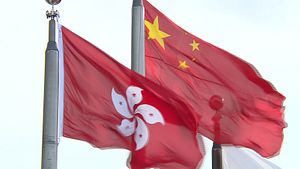Last week, Beijing confirmed that its legislative body would review a draft national security law tailored for the Hong Kong Special Administrative Region (HKSAR) during the annual session of the National People’s Congress (NPC). The draft legislation was amended on Tuesday and its scope expanded to ban “activities” by organizations and individuals that would “seriously endanger national security.”
By enacting the law, the NPC would effectively bypass Hong Kong’s Legislative Council (LegCo) to enact the national security legislation called for by Article 23 of the Basic Law – something LegCo has not seriously considered since massive protests stymied a prior attempt back in 2003. Tensions are already riding high in Hong Kong, with riot police walking the streets and hundreds arrested as LegCo opened debate on Wednesday on a law that would criminalize insults to the national anthem, “March of the Volunteers.”
Observers and analysts have signaled that the latest moves by Beijing may be representative of the steady demise of the “one country, two systems” arrangement that has managed the relationship between the HKSAR and the mainland since the 1997 handover. Defying these concerns, Beijing has doubled down on its commitment to crackdown on any actions in Hong Kong it deems subversive.
This commitment was on display during a speech and Q & A session by Xie Fang, the commissioner of the Ministry of Foreign Affairs of the SAR, on Monday. Xie’s speech emphasized five main points: 1) national security legislation for Hong Kong was both proper and required urgency; 2) Beijing’s law is both just and legitimate; 3) the legislation will ensure the success of “one country, two systems;” 4) the international community should not fear or panic in light of the new legislation; and 5) the Chinese government is “rock firm in upholding national sovereignty” and “in opposing any external interference in Hong Kong affairs.” Also of note was Xie’s articulation of “one country” as a prerequisite for “two systems,” stating that “should the ‘one country’ principle be undermined, ‘two systems’ would be out of the question.”
Chinese state media outlets, including the People’s Daily, China Daily, and the Global Times, have reinforced Beijing’s tough stance. For example, China Daily ran an editorial condemning the Western response to Beijing’s legislation and Hong Kong as embodying a double standard, arguing that the United States, the U.K., Australia, and Canada all have laws on the books to protect against acts such as separatism, terrorism, treason, espionage, secession, and subversion of the government. The same outlet highlighted Foreign Ministry Spokesperson Zhao Lijian’s comments warning against U.S. “meddling” in the SAR. Other outlets have emphasized support for Beijing’s position from neighboring countries, including statements from Cambodia’s Foreign Ministry and Russia’s foreign minister. People’s Daily reported on a petition backing the national security law that gained nearly 100,000 signatories in Hong Kong in a day (though there were reports elsewhere that banks and other enterprises were pressuring their employees to sign). Other articles still ran commentary from former Hong Kong government members to voice their support of the national security legislation, arguing it will bring stability to a city that has seen steadily increasing levels of strife and popular unrest in recent years.
The new law will reportedly allow mainland security agencies to operate officially in the HKSAR, which would have more than political consequences. Rising political tensions at both the local and international level vis-a-vis Hong Kong have also led to fears of capital flight from the city, whose stock market is the fourth largest in the world. While stocks appear to have rebounded early this week, the Hang Seng Index dropped more than 5.5 percent to close last week, suffering its biggest plunge since the July 2015 market bubble burst in China. Meanwhile, mainland capital flows into the Hong Kong market have accelerated, somewhat steadying the SAR’s market.
The financial turmoil came alongside promises by the Trump administration in the United States that it would “do something” about Beijing’s national security law. President Donald Trump signed the Hong Kong Human Rights and Democracy Act into law in November 2019, paving the way for the United States to monitor and respond to actions that may jeopardize Hong Kong’s autonomy. On Wednesday, a State Department report to Congress officially declared that the United States no longer considers Hong Kong autonomous. “No reasonable person can assert today that Hong Kong maintains a high degree of autonomy from China, given facts on the ground,” Secretary of State Mike Pompeo said in a statement announcing the decision.
The move puts in question the many special trade, financial, and legal provisions that govern U.S.-Hong Kong relations separately from the broader U.S.-China relationship, and will further impact Hong Kong’s status as a business and financial center.
Separately, Chris Pattern, the final British governor of Hong Kong prior to its handover, called on the U.K. government to take action, stating that the United Kingdom, which governed Hong Kong as a colony for over 150 years, has “a moral, economic, and legal duty to stand up for Hong Kong.”
Hong Kong Chief Executive Carrie Lam sought to downplay concerns over the new legislation, saying, “For the time being, people have this freedom to say whatever they want to say.” Lam added that the legislation only targets acts of subversion, secession, foreign interference, and terrorism. For all the public messaging being carried out by officials, the stage is set for more turmoil, as Beijing is unlikely to back down or compromise.

































